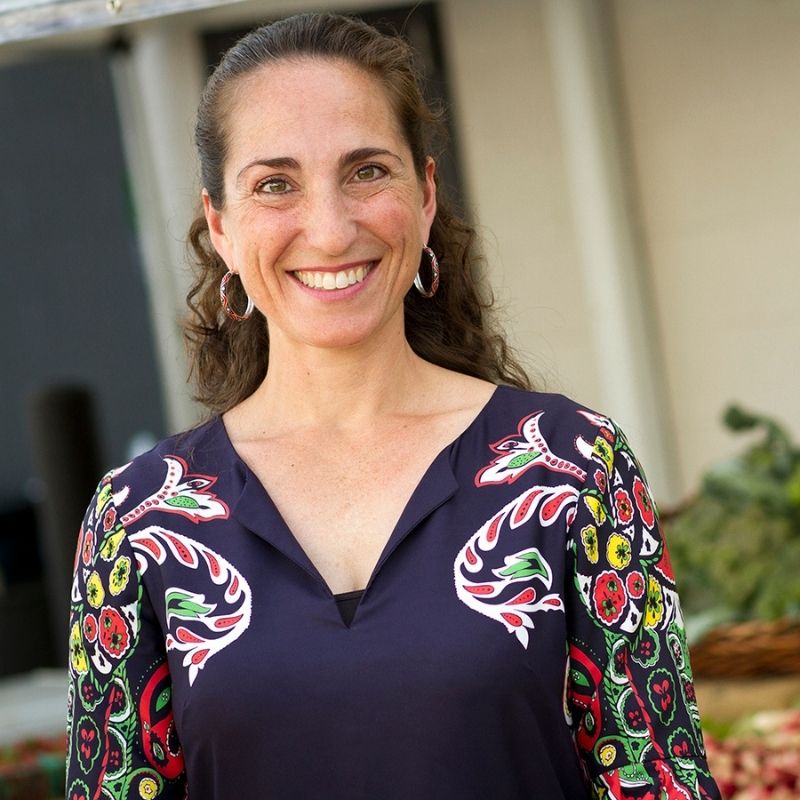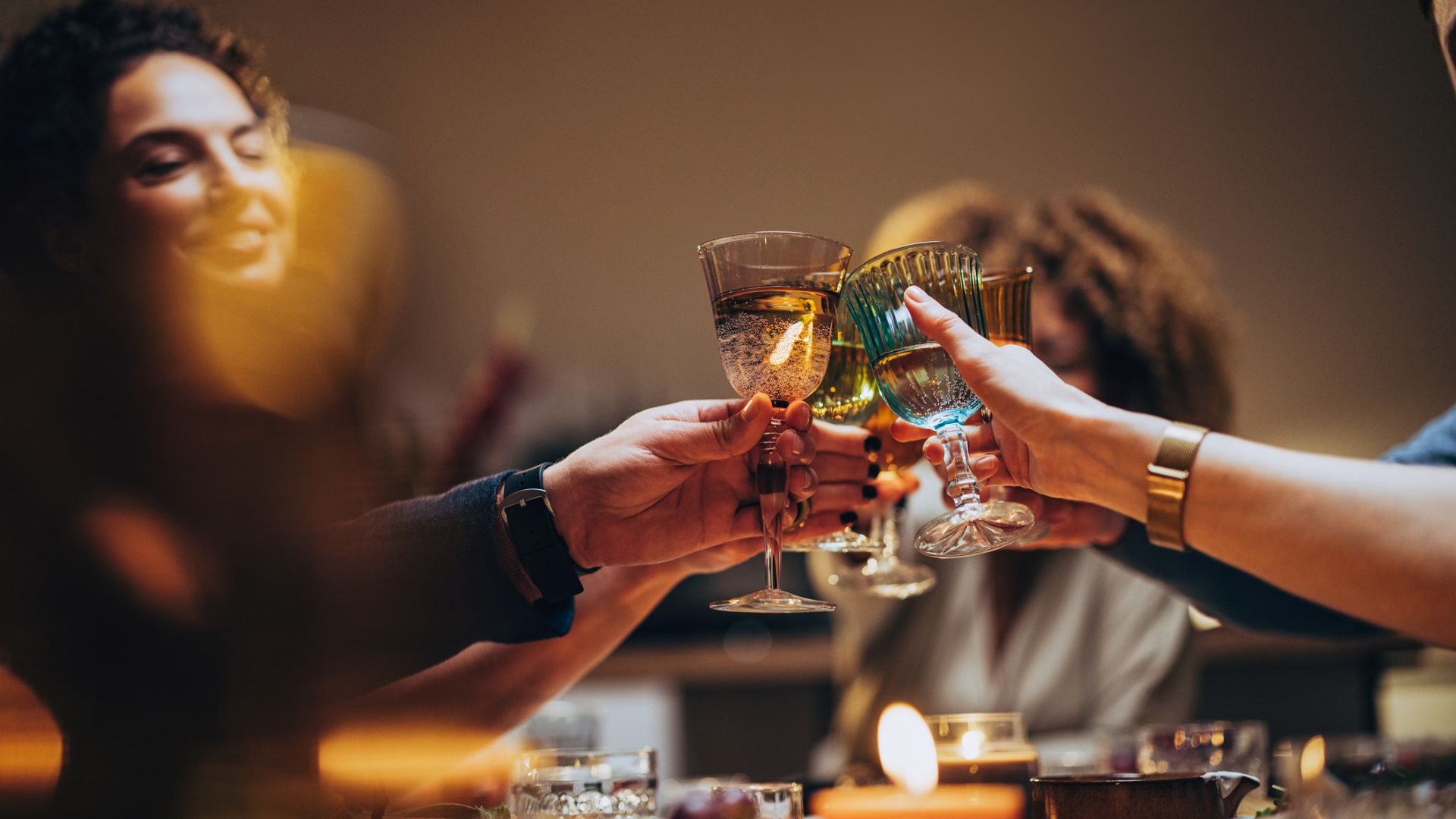What happens when you stop drinking alcohol for a month? Experts reveal the results to expect in less than 4 weeks
Wondering what happens when you stop drinking alcohol for a month? Doctors, biochemists and sober coaches reveal the first signs of change


Rose Goodman
What happens when you stop drinking alcohol for a month? If you've picked up the Dry January challenge for 2024, you may be curious to know what you can expect to change at the end of the four weeks. From better sleep to glowing skin, here the experts reveal them all.
For some people, the idea of ditching alcohol for a month isn't a problem at all. For others who drink every day or up to and over the 14 recommended units a week, it's a part of regular life. If you fit into the second group - as a reported 57% of UK adults do, per a survey by NHS England - giving up alcohol completely may seem like a big loss.
The effects of alcohol on bodies, moods and personalities are also becoming better understood all the time though, and drinking alcohol can have an overwhelmingly negative effect on the mind and body, so learning how to stop drinking for good must have a positive effect.
However, is a month without alcohol long enough to see a difference? Let's find out. Here, woman&home speaks to doctors, biochemists, and alcohol specialists to reveal what happens when you stop drinking alcohol for a month and all the benefits of not drinking alcohol for a few weeks.
What happens when you stop drinking alcohol for a month?
1. Your sleep quality will improve
While initially you may find it difficult to nod off as the sedative effects of alcohol were likely helping you drift off, if you make the choice to give up alcohol even just for a month, your sleep quality is likely to improve.
Even though alcohol may initially help us go to sleep, it disrupts the quality of sleep as we frequently wake up to use the toilet or from other disturbances, such as snoring. It also affects our biological clock’s response to light cues, which keeps our sleep-wake cycle in sync.
Emma Laing PhD, a clinical professor and director of dietetics at the University of Georgia, says this can turn into a long-term problem as well. "Over time, the cumulative effect of restless nights could cause drowsiness during the daytime, which can affect mood, decision-making ability, and productivity. A tolerance to the sedative effects of alcohol can also develop in some people, meaning that more alcohol is needed before bedtime and before drowsiness occurs."
Sign up to our free daily email for the latest royal and entertainment news, interesting opinion, expert advice on styling and beauty trends, and no-nonsense guides to the health and wellness questions you want answered.
However, neuroscientist and sleep specialist Dr Lindsay Browning says, "Once you get used to falling asleep without alcohol, sleep quality will improve."
When will you see the benefit? Expect changes after a week of sobriety, or, for heavier drinkers, it may take up to six months.

Emma Laing, PhD, RDN, FAND is a spokesperson for the Academy of Nutrition and Dietetics and director of dietetics at the University of Georgia. Laing graduated from the University of Delaware and earned master's and doctoral degrees from the University of Georgia. She has held national, state and local leadership roles in professional organizations and has received awards for excellence in teaching, mentoring, and service to the media.

Dr Lindsay Browning is a chartered psychologist and associate fellow of the British Psychological Society, a member of the British Sleep Society, a sleep specialist, author of the self-help sleep book, Navigating Sleeplessness, and the in-house expert for And So To Bed.
Dr Browning has a doctorate from the University of Oxford, where she investigated the relationship between worry and insomnia. She is passionate about helping people of all ages to sleep well, working with organisations and hotels to offer sleep consultancy and better sleep sessions.
2. You'll have more energy
Hangovers get worse as we get older - the benefits of cutting back on alcohol during menopause are well documented - and even just one or two drinks can lead to heavy feelings of lethagy and a lack of motivation the next day. “Alcohol is a depressant that can lead to fatigue,” says sober living coach, Laura Lee Wright. "Quitting drinking can increase energy levels and you may notice you have more vitality and motivation for daily activities."
Not only that, but if you have other lifestyle goals (like picking up a hobby, staying in touch with friends more, working out regularly, for example), then putting drinking to one side for a month can really help you get them off the ground. Looking for one of the best New Year's Resolution ideas for 2024? This could be it. There's little chance you'll want to get up early and head to the gym or meet a friend for coffee before work if your body is already tired from processing last night's drinking.
When will I feel the benefit? The first day you wake up without a hangover when you'd otherwise have one. Research from La Trobe University in Melbourne, Australia, says as much. The study found that the cognitive performance of participants was heavily impacted by fatigue as a result of drinking alcohol. I.e. quitting drinking can help boost your brain power and reduce fatigue, offering more motivation for the day.

Laura Lee Wright is a sober activist and author of Beyond Sober: You Put Down the Booze, Now What? Laura is a lifelong writer, dynamic public speaker, mom, and activist for sobriety. She believes in creating healthier and happier workspaces where employees can thrive and achieve their best potential. With this in mind, she provides guidance and resources to help teams pivot towards a more positive drinking culture that promotes mental and physical wellbeing.
3. You won't feel dehydrated
Famously, alcohol is a diuretic, explains Lee Weight. "[This means it] causes the body to lose fluids. When you stop drinking, your body can stay hydrated, leading to better skin complexion and overall wellbeing."
Plus, if you're not drinking, you won't have to worry about that horrible dry mouth feeling in the morning or when you wake up in the middle of the night.
When will I feel the benefit? We tend to be most dehydrated in the mornings anyway, as we've spent the last eight hours (hopefully) not drinking water. As soon as you stop adding the dehydrating effects of alcohol to the equation, you'll see the difference - so you'll feel the difference in as little as 24 hours.

4. You may lose weight
A regular glass of wine is the equivalent of eating three Jaffa Cakes – which soon adds up. Not to mention, booze triggers cravings for salty snacks and sugar cravings tend to emerge with a hangover.
"Alcohol can also cause stress on the stomach and lead to decreased food movement through the digestive tract, which affects metabolism," says nutrition expert Penny Weston.
Not only that but to lose weight sustainably and effectively, you need to burn more calories than you eat daily - otherwise known as a calorie deficit. This is difficult to achieve without regular daily movement, something that also tends to fall by the wayside with drinking and its effects.
When will I see the benefit? Stop drinking and you’ll likely notice a change on the scales after just two weeks.

Penny Weston is highly regarded as a fitness, wellness and nutrition expert, and runs award-winning health spa, Moddershall Oaks and leading wellness centre, MADE; a 360 wellness centre complete with boutique fitness gym, studios, treatment rooms, retail shop and health café. She is dedicated to demonstrating how by making small changes to routines, people can experience big results when it comes to happiness, energy levels and mental state.
5. Your emotions may feel more intense
That's not to say that quitting alcohol for a month is easy work. Gillian Tietz, a biochemist and host of the Sober Powered podcast, says that because of the way alcohol affects the brain, giving it up can be emotionally challenging to begin with - even if you don't have a diagnosed drinking problem.
"The body is resilient and heals faster than the brain does," she explains. "Early sobriety can cause more intense emotions since alcohol numbs emotions, even if you aren't intending to drink to cope."
When these emotions are allowed to exist again, they can be more intense, she warns. "We have less ability to deal with them because we don't have practice. Alcohol damages all areas of the brain and it takes time for the brain to heal from all the damage caused by alcohol. This is why it's possible to have more intense emotions because the brain is healing."
It's one of the reasons why sober dating has taken off in recent years, with many people finding they are better able to create and maintain more emotionally intimate and longer-lasting relationships without alcohol.
When will I feel the benefit? You may feel anxious and low to begin with and this can last between a few days and six weeks, depending on how much you were drinking, so this may be one of the benefits that appears later in the month.
"You may feel worse if alcohol has been your coping mechanism," adds Dr Emer MacSweeney, CEO at Re:Cognition Health. "This is because the brain’s neurotransmitters are trying to restore balance."

Gillian Tietz is a biochemist who quit drinking in 2019, a move that inspired her to start her podcast, Sober Powered, where she utilizes her biochemistry background to teach others how alcohol affects the brain and why it’s so hard to stop drinking.
6. You'll have more time
Okay, back to the positives. One of the immediate benefits of taking a break from alcohol is the time freed up in your schedule for other activities. Even if we don't realise it day-to-day, drinking alcohol (and recovering from a hangover) can take up a lot of time.
You’ll have time for hobbies you might have stopped doing because you’ve prioritised drinking. You’ll have more time with family and friends that doesn’t revolve around drinking. Most importantly, you’ll have more time for yourself, more time to focus on yourself and more time to feel good about yourself.
When will I feel the benefit? This benefit will come almost straight away. It materialises the first time you're able to invest time in yourself when you'd otherwise be drinking or hungover.
7. Your skin will improve
The physical benefits of not drinking alcohol can't be ignored - but you might be surprised to learn what alcohol does to your face. "Alcohol dehydrates the skin, which can cause dryness, sunken eyes and decreased elasticity," says Dr Rayhaneh Zahedi, working with AlumierMD.
Stopping drinking will reduce fine lines and wrinkles, and give the skin a healthier glow. With even short-term sobriety, many people notice improved skin appearance, including reduced inflammation, less redness, and fewer breakouts.
When will you see the benefit? "You’ll usually see changes within a few weeks," adds Dr Zahedi.
7. You'll have more money
Alcohol is expensive, and, let’s face it, the prices are only going up. When you take a step back and realise how much money you’re spending on alcohol, even if you’re a moderate drinker, it might be quite alarming.
When you’re not drinking, you’ll have money for other things that you perhaps thought you couldn’t afford. If you're wondering about the difference it can make, and aren't planning to give up alcohol this month, consider keeping tabs on your alcohol spending for a month and work out how much you'd save if you took the plunge. Then spend that money on something else that brings you enjoyment, whether it's a delicious meal out with your partner or friend, an item of clothing, or putting it towards a holiday.
When will you see the benefit? This one's pretty immediate too, but you could download one of the best organisation apps to manage your spending and see how much you could save in a few weeks.

There are so many delicious alcohol alternatives available now to make sobriety or cutting back easier, including 0% wines, beers, and spirits.
What happens after two months of no alcohol?
The longer you don't drink, the more permanent the positive changes and benefits become. As noted by many of the experts, if you are a heavier drinker then you may not see what happens when you stop drinking alcohol for a month for six weeks, so two months of sobriety may be what you need.
"The first month is mostly physical benefits: less heartburn, reduced anxiety, better sleep, reduced depression, more energy, lower resting heart rate, lower blood pressure, improved digestion, better nutrient absorption, less liver fat, lower cholesterol,” says Tietz. “The second and third months are more cognitive and emotional benefits: clearer thinking, better decision-making skills and memory, more even emotions. Many people will feel like a fog has lifted around the end of the second month."
How long does it take to see the benefits of no alcohol?
"Most people begin to see changes within the first week of quitting drinking," Laura Lee Wright says. "Some of those changes, like withdrawal or cravings, don't feel good. Once the initial uncomfortable part of putting down the alcohol is over, many people experience a kind of euphoria from being sober."
Sobriety platform Sober Curious even suggests that these benefits come within the first four days of giving up drinking, pointing to research by Ohio University, as this is when the craving for alcohol subsides. As alcohol is incredibly sugary, it's normal to feel a slight sugar withdrawal when you stop drinking. The study, however, suggests that from day seven, this stops completely.
Other benefits can occur within the first month that you won’t be aware of, but that are important to your health and wellbeing. "Your liver can start to recover from the effects of alcohol. Liver inflammation may decrease, and liver enzymes may return to normal levels," the sober coach says.
Tips to stop drinking for a month
- Find a support group: It could be a sober friend who is also looking to learn how to avoid alcohol or a more regimented, formal support group with people you don't already know. Either way, "for people who want to try long-term sobriety there are many support groups available to help them achieve that goal," says Lee Wright.
- Focus on the present: "Don't project into the future, that can make the idea of life-long abstinence seem daunting," says the sober coach. You'll only find out what happens when you stop drinking alcohol for a month if you get past the first few days and weeks.
- Expand your knowledge: Knowing more about the world of sober living and all the benefits it can bring you can help you be more excited about the prospect, especially if you're a little nervous about what life will look like. Some of the best quit-lit books and podcasts are a great way to get into this as they feature stories from (mainly women) who've done the exact same thing.
- Find alternatives: Opt for alcohol-free versions of your favourites, or choose lower-strength alcohol, such as having a white wine spritzer, or an ABV (alcohol strength by volume) of between 0.5% and 1.2%. Having one of the best alternatives to alcohol by your side can really make a difference.
- Try cutting back: If you're finding it difficult to go from a hundred to zero, why not consider trying to cut down on alcohol instead? While Dry January is a popular time to quit, it may be more effective to reduce the amount you drink slowly. This will help ease adverse side effects, especially for heavier drinkers.
If you choose to make sobriety a long-term plan then you'll likely see a continuation of what happens when you stop drinking alcohol for a month, if not more benefits. "Many of the benefits of sobriety happen by the end of the first year, but the full benefits are seen after five to seven years," says Tietz. "It takes time for the brain's dopamine system (reward system) to heal as well, and people can experience a lack of pleasure or everything feeling dull around three to six months of sobriety."
"Alcohol releases two to 10 times more dopamine than natural rewards do, so it takes time for the brain's reward system to recalibrate and for natural rewards (walking, cuddling a pet, socialising, going to the gym, etc) to have the impact they should," she says.
Samantha is a freelance writer from Yorkshire, writing about health and wellbeing for Woman & Home, Reader's Digest, Giddy, and Good Housekeeping. For the past 15 years, she's combined her personal experiences with reporting, to write about menopause, fitness, sleep, and healthy eating. She also writes about travel and food and drink for The Independent, The Good food Guide, Lonely Planet, Frommer's, and more.
- Rose GoodmanHealth Writer
